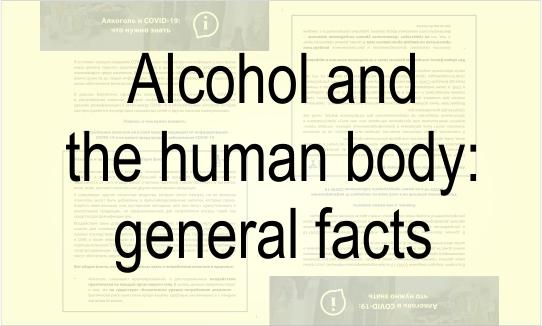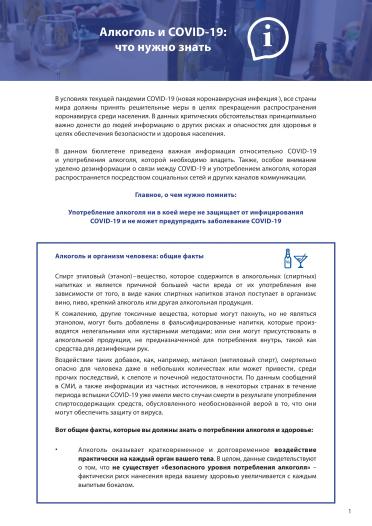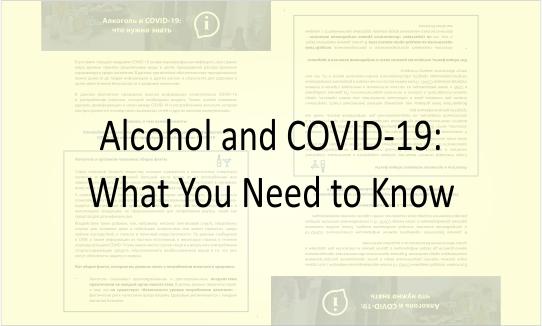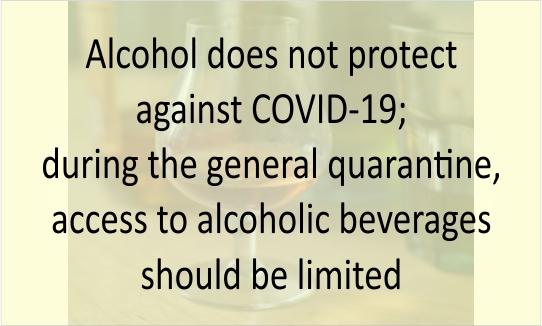Alcohol and the human body: general facts

Ethyl alcohol (ethanol) - a substance that is contained in alcoholic (alcoholic) drinks and is the cause of most of the harm from their use, regardless of which alcoholic beverages ethanol enters the body: wine, beer, spirits or other alcoholic products.
Unfortunately, other toxic substances that may smell but are not ethanol can be added to adulterated drinks that are produced by illegal or artisanal methods; or they may be present in alcoholic products not intended for ingestion, such as hand sanitizers.
Exposure to additives such as methanol (methyl alcohol) is fatal to humans even in small amounts or can lead to blindness and kidney failure, among other effects. According to media reports, as well as information from private sources, in some countries during the COVID-19 outbreak, there have already been deaths due to the use of alcohol-based products based on the unfounded belief that they can provide protection against the virus.
Here are the general facts you should know about alcohol consumption and health

- Alcohol has short-term and long-term effects on almost every organ in your body. Overall, the evidence suggests that there is no “safe level of alcohol consumption” – in fact, the risk of harm to your health increases with every drink you drink.
- Alcohol consumption, especially excessive drinking, weakens the immune system and thus reduces the body's ability to resist infectious diseases.
- Drinking alcohol, even in small amounts, is known to be one of the causes of some types of cancer.
- Alcohol changes your thoughts, judgments, decision making and behavior.
- Drinking alcohol, even in small doses, poses a risk to the developing fetus during the entire period of pregnancy.
- Alcohol use is associated with an increased risk, frequency and intensity of violence in intimate and sexual relationships, as well as among young people and against the elderly and children.
- Alcohol consumption increases the risk of injury and death from road accidents, drowning or falls.
- Excessive alcohol consumption is a risk factor for acute respiratory distress syndrome (ARDS), one of the most severe complications of COVID-19.
By WHO Regional Office for Europe.
Read more
Alcohol and coronavirus: what you need to know
Alcohol and COVID-19: What You Need to Know With the current COVID-19 (novel coronavirus infection) pandemic, all countries in the world must take decisive action to stop the spread of the coronavirus among the population. In these critical circumstances, it is critical to educate people about other health risks and hazards in order to ensure the safety and health of the public. This bulletin contains important information you need to know about COVID-19 and alcohol use. Also, special attention is paid to misinformation about the connection between COVID-19 and alcohol consumption, which is spread through social networks and other communication channels. The main things to remember: Drinking alcohol in no way protects against COVID-19 infection and cannot prevent COVID-19 disease. By WHO Regional Office for Europe . Read more Alcohol does not protect against COVID-19 Alcohol does not protect against COVID-19; during the general quarantine, access to alcoholic beverages…
Alcohol does not protect against COVID-19
Alcohol does not protect against COVID-19; during the general quarantine, access to alcoholic beverages should be limited It is known that drinking alcohol in general is harmful to our health. We also know that alcohol use increases the risk of injury and violence, including intimate partner violence, and can lead to alcohol poisoning. During the general quarantine due to the COVID-19 pandemic, alcohol consumption can expose people's health even more, as well as increase the prevalence of risky behavior, mental health problems and violence. WHO / Europe reminds residents of the Region that alcohol consumption does not protect them from COVID-19, and recommends that national governments introduce measures to limit alcohol consumption. Dispelling…
Trump on plan to get Americans back to work
Trump on the plan to get Americans back to work: "Careful, step by step" The specifics of the implementation of the plan will be taken into account from state to state: the regions least affected by the outbreak will be the first to return to normal. President Donald Trump on Thursday outlined the basic principles under which the US economy, severely affected by the coronavirus pandemic, can reopen, returning millions of jobs to the country. Trump unveiled the new plan Thursday night during a daily press briefing by the White House working group…


